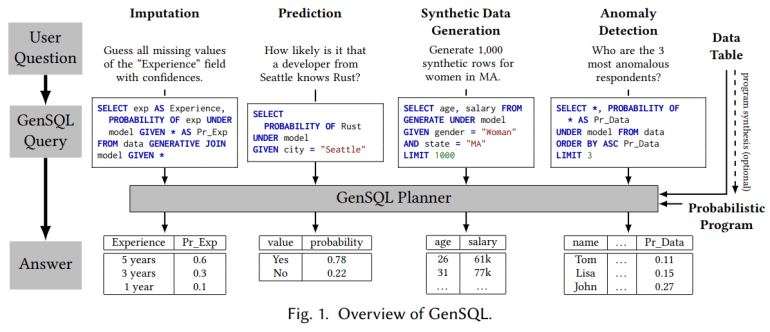- GenSQL introduces a revolutionary system integrating generative models into SQL databases.
- Developed by MIT, Digital Garage, and Carnegie Mellon for complex Bayesian workflows.
- Enables anomaly detection, synthetic data generation, and sophisticated database operations.
- Boasts up to 6.8x speedup over competitors in query execution performance.
- Open-source with support for various probabilistic programming languages.
Main AI News:
GenSQL emerges as a groundbreaking system designed to seamlessly integrate generative models into SQL databases, revolutionizing Bayesian workflows and probabilistic programming. Developed collaboratively by researchers from MIT, Digital Garage, and Carnegie Mellon, GenSQL extends traditional SQL with innovative primitives tailored for complex Bayesian analyses. Its robust framework enables users to merge probabilistic models with tabular data effortlessly, facilitating tasks such as anomaly detection, synthetic data generation, and sophisticated database operations.
The system’s architecture ensures both accuracy and efficiency in query execution, boasting superior performance benchmarks with speedups up to 6.8x compared to its competitors. GenSQL’s open-source implementation supports diverse probabilistic programming languages, making it a versatile tool for real-world applications across various domains.
Probabilistic databases leverage efficient algorithms for inference queries on discrete distributions, integrating probabilities into relational systems for tasks like data imputation and random data generation. GenSQL offers a formal system with denotational semantics, soundness guarantees, and a unified interface for integrating probabilistic models. The semantics of probabilistic databases have been rigorously explored through various frameworks and formalizations, with GenSQL leveraging probabilistic program synthesis to enable powerful Bayesian workflows and support models from different probabilistic programming languages. Unlike BayesDB, GenSQL introduces novel semantic concepts, soundness theorems, and enhanced performance and expressiveness, enabling nested queries and the combination of results from multiple models.
GenSQL represents a significant advancement in probabilistic SQL extensions designed specifically for querying from probabilistic tabular data models. It includes constructs for traditional SQL operations and probabilistic models, featuring distinct names and types for columns and tables to ensure well-typed expressions. The system’s type system handles both continuous and discrete types, with special rules for events with zero probability. GenSQL’s semantics employ measure theory for probabilistic aspects, offering compositional semantics for expressions and including conditioning constructs, syntactic shortcuts, and special null-value treatment. GenSQL excels in tasks such as generating synthetic data, querying probabilistic models, and handling complex conditional queries.
The evaluation of GenSQL, a Clojure-based probabilistic SQL extension, compares its performance against similar systems on an Amazon EC2 C6a instance. The study benchmarks runtime and optimizations using probabilistic models generated via ClojureCat. GenSQL outperforms BayesDB significantly across ten benchmark queries, achieving speedups ranging from 1.7x to 6.8x due to its efficient ClojureCat backend and strategic optimizations like caching and exploiting column independence. Case studies illustrate its practical applications in anomaly detection in clinical trials and synthetic data generation for genetic experiments, demonstrating its effectiveness in complex data analysis and modeling scenarios.
Conclusion:
GenSQL represents a significant leap forward in integrating probabilistic models with traditional SQL databases. Its enhanced performance and versatility across different domains underscore its potential to redefine data analysis capabilities, particularly in fields requiring complex probabilistic modeling and efficient query execution. This innovation positions GenSQL as a pivotal tool for advancing Bayesian workflows and driving greater insights from integrated tabular data and probabilistic models within the market.

